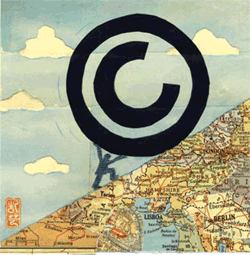CIAO DATE: 02/04
Foreign Policy
Digital Donnybrook
Brian Wingfield*
In December 2004, the European Commission will release its first progress report on the European Union Copyright Directive (EUCD). Passed in 2001, the EUCD was intended to harmonize copyright law throughout the EU's 15 member states. Instead, it sparked a showdown between large copyright holders and digital rights activists.
As in the United States, where a similar battle rages, the most controversial issue is copyright circumvention. The EUCD prohibits technologies that are used to bypass copyright protection on digital works — movies, music, software — that are traded illegally on the Internet thousands of times each day. The commission's December report is critical because it will help shape the legislative climate toward Internet copyright law.
 |
| Illustration by Poul Hans Lange |
EUCD opponents hope to tip the report in their favor by highlighting the new law's incipient shortcomings. In particular, EUCD critics want European lawmakers to consider the pitfalls of the United States' Digital Millennium Copyright Act (DMCA), which makes the circumvention of copyrights for personal use illegal.
The Recording Industry Association of America (www.riaa.org) invoked the DMCA last summer when it threatened hundreds of "Internetistas" with lawsuits for downloading music. Similar action has not yet swept through Europe, but it could, argue EUCD critics such as the European Net Alliance (which includes telecom giants like Vodafone and British Telecom) and the Foundation for Information Policy Research (www.fipr.org), a British think tank fighting for a "fair use" provision that allows for nonprofit reproduction of intellectual property by academics, news reporters, and the like.
Changing the EUCD promises to be an uphill battle. "The rights holders to some extent have [already] got their way," says Ian Brown, FIPR's director. Still, now may be the critics' best chance for change. The commission's second progress report won't be published until 2007. By then, the nature of the Internet will have changed considerably — all the more reason to get it right this time around.
Notes
Note *: Brian Wingfield is a Washington, D.C.-based journalist. Back